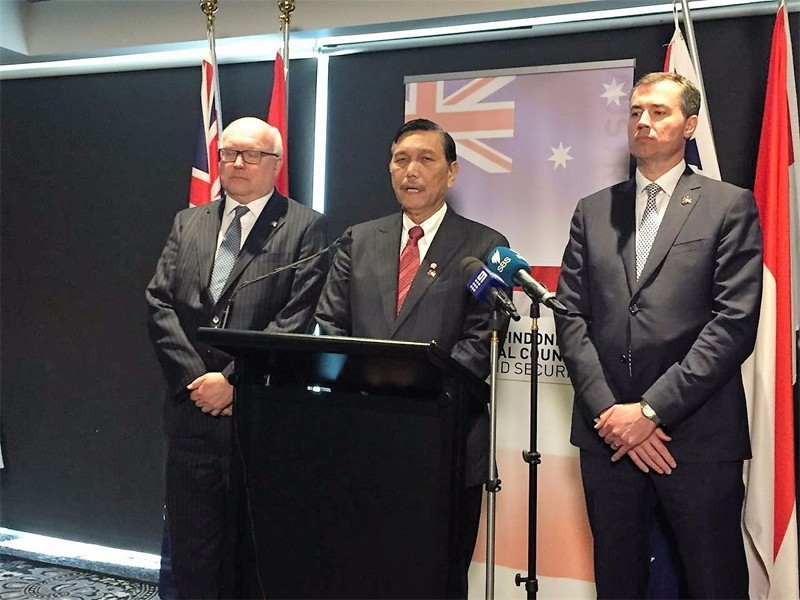Popular Reads
Top Results
Can't find what you're looking for?
View all search resultsPopular Reads
Top Results
Can't find what you're looking for?
View all search resultsI am unknown to most of you and yet I call you my friends
Change text size
Gift Premium Articles
to Anyone
 Coordinating Political, Legal, and Security Affairs Minister Luhut Binsar Pandjaitan with Australian Attorney-General Senator George Brandis (left) and Australian Justice Minister Michael Keenan (right) give their remarks following bilateral meeting between Indonesia and Australia in Sydney, Australia, on Wednesday. (Courtesy/Office of the Coordinating Minister of Political, Legal, and Security/-)
Coordinating Political, Legal, and Security Affairs Minister Luhut Binsar Pandjaitan with Australian Attorney-General Senator George Brandis (left) and Australian Justice Minister Michael Keenan (right) give their remarks following bilateral meeting between Indonesia and Australia in Sydney, Australia, on Wednesday. (Courtesy/Office of the Coordinating Minister of Political, Legal, and Security/-)
I
ndonesia celebrated its 71st anniversary of independence on Aug. 17. Australia’s support was instrumental for Indonesia’s formation in 1945.
In November 1945, then Indonesian prime minister Sutan Sjahrir thanked the Australian nation through a radio address. “I am unknown to most of you, and yet I call you my friends.
The workers who refused to load Dutch ships with arms and munitions, which would be used against our republic, the thousands holding demonstrations, the thousands who sympathize with our struggle for freedom, you are all my friends.”
While the young republic engaged in four years of tough diplomatic negotiations and fierce fighting, the Australian government worked to secure the UN’s support for Indonesia.
A long time ago, my teacher taught me that history was inescapable. It is through history that we can connect ourselves to the past. History inspires us for tomorrow.
It is important to understand the forces and events that may shape our environment and thus our possible decisions. In the next few decades, Australia and Indonesia will face some of their biggest challenges and opportunities.
The world in 2030 will look different, partly due to changes in demographic composition.
Today, the world population stands at 6.6 billion, while in 2030 it will grow to 8.3 billion.
The Indonesia of the 2030s will be dominated by a young and productive age population living in one of the top 10-biggest economies in the world.
Australia too will undergo significant changes. The Australian Bureau of Statistics projects that its population will grow to almost 26 million by 2030. Social researcher Mark McCrindle forecasts that the average household income will grow from US$50,000 today to $200,000 in 2030.
One common challenge for Australia and Indonesia is obviously increased population pressure. Australia will have to respond to the challenges of an aging population resulting in declining labor force participation, falling average work hours and slowing economic growth.
Indonesia too will need to address the pressure brought by 285 million Indonesians on the nation’s resources. The government will need to maintain a high and steady rate of growth that creates quality jobs and can absorb the millions of new job seekers coming into the pipeline over the period.
Designing policies that provide solutions to those challenges would then be the main preoccupation of today’s and future national governments.
Development planning, policies and regulations have to be designed to unleash productivity, connect people, create economic opportunity, to ease the doing of business, open markets and slash unproductive practices.
Government policies will also need to be targeted to narrowing the development gap between provinces and cities.
Another challenge is promoting a culture of innovation and science across Indonesia to help sustain growth and escape from the possible middle-income trap.
By the 2050s, Australia and Indonesia will live in a region that is much bigger than it is now, economically, demographically and militarily. Bilateral trade and investment will be significantly larger.
More Indonesians will be studying in Australia and many more tourists will be crossing our borders. In the last two months, Indonesia became the top destination for Australian vacationers. Over the next decades, we will be more interdependent with each other.
It is quite natural and expected that two neighboring countries will have differences and misunderstanding from time to time. But I am happy to see the consistent commitment and work by all stakeholders in both countries is adding to the resilience of the relationship. It is unproductive and damaging to let the three B’s of Bali, beef and boats define our overall relations.
Australia and Indonesia are following through on their commitments to forge strong partnerships, including by addressing the challenges of people smuggling, counterterrorism and drafting a high-standard comprehensive economic partnership.
In the 2030s, ASEAN will transform from today’s seventh-largest economy in the world to the fourth largest. While ASEAN will continue as one of the global hubs of manufacturing and trade, with 67 million consumers and predicted to double to 125 million by 2025, it would also boast one of the largest consumer markets in the world.
The challenge is to diversify ASEAN’s export destinations to ensure that it does not depend too heavily on a single international market. Another challenge is to ensure the unity of ASEAN in the face of strong external pressure and to put the members firmly behind the driver’s seat.
As in the past, Indonesia will continue its partnership with Australia in ASEAN and other regional organizations.
The next few decades are a defining period for Australia-Indonesia and their role in the region. Our partnership should continue to focus on finding solutions to today’s problems and preparing the foundation for future opportunities.
Early in our history, leaders of Indonesia and Australia realized that both nations have many mutual interests. Australia’s early support was crucial for Indonesia’s future. In turn, Prime minister Sutan foresaw the future when he ended his address in 1945 by saying: “We can and we will certainly establish close relations as good neighbors.”
___________________________
The writer is Indonesian ambassador to Australia. The views expressed are his own.









